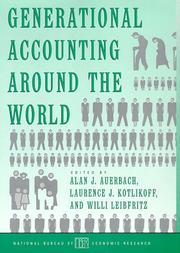| Listing 1 - 4 of 4 |
Sort by
|
Book
ISBN: 0262526107 0262016729 9786613594488 0262301555 1280499257 9780262301558 9781280499258 9780262016728 0262300796 9780262526104 Year: 2012 Publisher: Cambridge, MA MIT Press
Abstract | Keywords | Export | Availability | Bookmark
 Loading...
Loading...Choose an application
- Reference Manager
- EndNote
- RefWorks (Direct export to RefWorks)
How America went bankrupt and how we can save ourselves--as a country and as individuals--from economic disaster.
Budget deficits -- United States. --- Fiscal policy -- United States. --- Generational accounting -- United States. --- United States -- Economic conditions -- 21st century. --- Budget deficits --- Generational accounting --- Fiscal policy --- Business & Economics --- Economic History --- United States --- Economic conditions --- Generational accounts --- Finance, Public --- Accounting --- E-books --- 330.973
Book
ISBN: 0029184630 Year: 1992 Publisher: New York : Toronto : New York : Free Press ; Maxwell Macmillan Canada ; Maxwell Macmillan International,
Abstract | Keywords | Export | Availability | Bookmark
 Loading...
Loading...Choose an application
- Reference Manager
- EndNote
- RefWorks (Direct export to RefWorks)
Fiscal policy --- Politique fiscale --- Budget deficits --- Déficit budgétaire --- Generational accounting --- Comptabilité par génération --- Conditions économiques --- United States --- Economic conditions --- Déficit budgétaire --- Comptabilité par génération --- Conditions économiques

ISBN: 0521806429 0521001153 1107131251 0511119739 0511041780 0511148372 0511302649 0511606435 1280154926 0511044194 9780511041785 9780511148378 9780511119736 9780511606434 9780511044199 9781280154928 9786610154920 6610154929 9780521806428 9780521001151 Year: 2002 Publisher: Cambridge: Cambridge university press,
Abstract | Keywords | Export | Availability | Bookmark
 Loading...
Loading...Choose an application
- Reference Manager
- EndNote
- RefWorks (Direct export to RefWorks)
Provides an in-depth treatment of the overlapping generations model in economics incorporating production. Chapter 1 investigates competitive equilibria and corresponding dynamics: existence and uniqueness of equilibrium, global dynamics of capital (including poverty traps), and various extensions of the model. Chapter 2 analyzes the optimality of allocations in this framework, using both the value function and marginal approaches. Optimality with unbounded growth is also analyzed. Policy issues including the Second Welfare Theorem, pensions, government spending, and optimal taxation, are discussed in chapter 3. The notion of public debt is introduced in chapter 4 and the sustainability of policies with budget deficits/surpluses is examined. The last chapter presents extensions of the model including altruism, education/human capital, and habit formation. Methodological emphasis is put on using general preferences and technologies, on the global study of dynamic aspects of the model, and on furnishing adequate tools to analyze policies involving inter-generational transfers.
Macroeconomics --- Economic development --- Economic policy --- Generational accounting --- AA / International- internationaal --- 304.4 --- 338.8 --- 331.04 --- 304.2 --- Cyclische veranderingen. --- Economische groei. --- Langdurige bewegingen. --- Trendanalyse. Tendenties van lange duur. --- Economic policy. --- Macroeconomics. --- Economic Theory --- Business & Economics --- 330.35 --- 338.22 --- Generational accounts --- Finance, Public --- Economic nationalism --- Economic planning --- National planning --- State planning --- Economics --- Planning --- National security --- Social policy --- Development, Economic --- Economic growth --- Growth, Economic --- Statics and dynamics (Social sciences) --- Development economics --- Resource curse --- Economische groei. Kwantitatieve toename. Technische vooruitgang --zie ook {338.09} --- Economische organisatieleer. Economisch beleid. Economische politiek --- Accounting --- Economic development. --- Generational accounting. --- Business, Economy and Management --- 339 --- 338.22 Economische organisatieleer. Economisch beleid. Economische politiek --- 330.35 Economische groei. Kwantitatieve toename. Technische vooruitgang --zie ook {338.09} --- Trendanalyse. Tendenties van lange duur --- Cyclische veranderingen --- Langdurige bewegingen --- Economische groei --- Développement économique --- Histoire économique --- Macroéconomie --- Politique économique --- Développement économique --- Histoire économique --- Macroéconomie --- Politique économique

ISBN: 0226032132 9786611223076 1281223077 0226032183 9780226032184 9780226032139 9780226032184 9781281223074 661122307X Year: 1999 Publisher: Chicago (Ill.): University of Chicago press,
Abstract | Keywords | Export | Availability | Bookmark
 Loading...
Loading...Choose an application
- Reference Manager
- EndNote
- RefWorks (Direct export to RefWorks)
The realities of mounting government debt, tax burdens, and an aging population raise serious concerns about the financial legacy confronting future generations. How great a fiscal burden will current policies leave to subsequent generations, and how might changes in those policies alter the intergenerational distribution of public welfare? Generational accounting has recently emerged as a robust new method of fiscal analysis and planning designed to assess the long-term sustainability of fiscal policy and to measure the extent of the financial load ultimately borne by present and future generations. A seminal contribution to public economics, generational accounting has already been adopted by 23 nations around the world. Combining the latest and most extensive country-by-country generational analyses with a comprehensive review of generational accounting's innovative methodology, these papers are a consummate resource for economists, political scientists, and policy makers concerned with fiscal health and responsibility.
Generational accounting --- Bejaardenproblematiek 312-053.8 --- Sociale zekerheid 368.4 --- #SBIB:33H16 --- #SBIB:35H435 --- #SBIB:35H437 --- AA / International- internationaal --- 305.93 --- 336.61 --- 311.94 --- 339.5 --- Generational accounts --- Finance, Public --- Publieke financiën --- Beleidssectoren: economisch en werkgelegenheidsbeleid --- Beleidssectoren: sociale zekerheid --- Econometrie van het gedrag van de overheid, van de uitgaven en ontvangsten van de overheid, van de begroting. Econometrie van de belastingen. --- Financieel beleid. --- Verdeling van de bevolking naar leeftijd. Veroudering van de bevolking. --- Accounting --- Generational accounting. --- Accounting. --- Government accounting --- Governmental accounting --- Public accounting --- Econometrie van het gedrag van de overheid, van de uitgaven en ontvangsten van de overheid, van de begroting. Econometrie van de belastingen --- Verdeling van de bevolking naar leeftijd. Veroudering van de bevolking --- Financieel beleid --- accountant, finance, financial, money, wealth, income, economy, economics, career, worldwide, international, global, debt, government, tax, taxes, population, aging, growing old, legacy, future, generations, fiscal, policies, welfare, intergenerational, millennial, gen z, analysis, planning, savings, sustainability, academic, scholarly, research, higher ed, college, university, textbook.
| Listing 1 - 4 of 4 |
Sort by
|

 Search
Search Feedback
Feedback About UniCat
About UniCat  Help
Help News
News